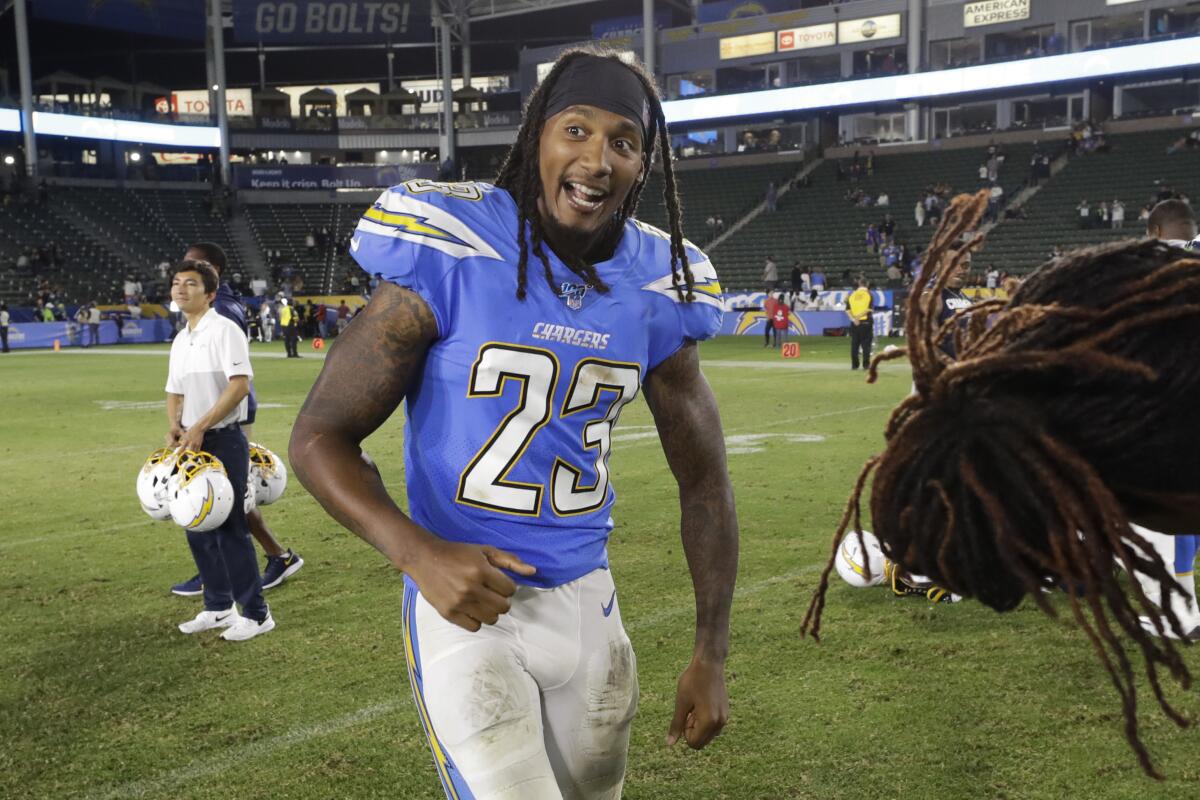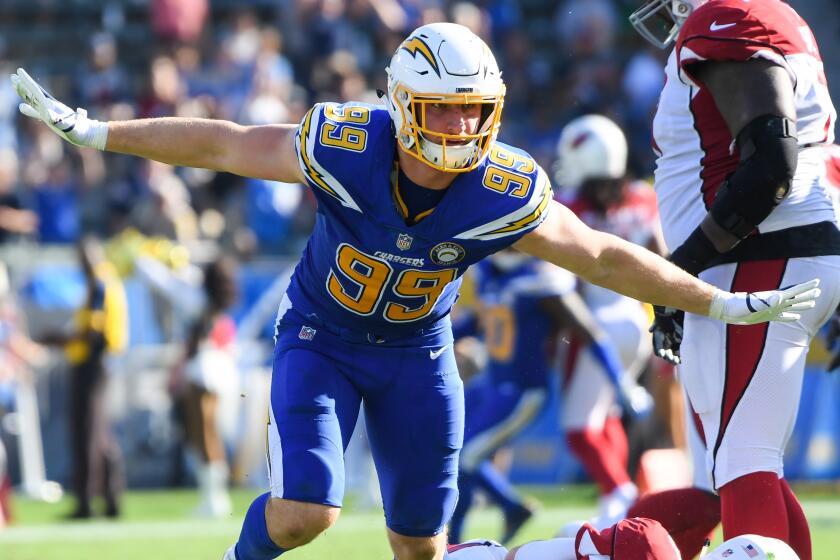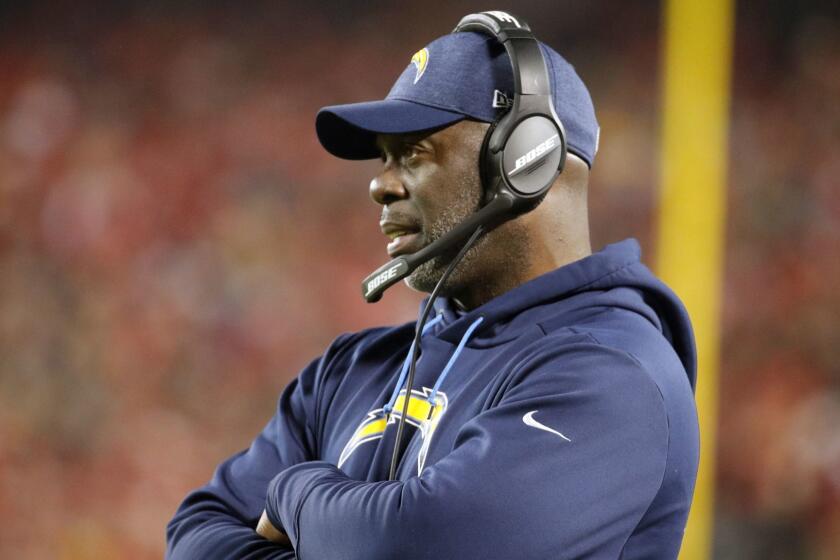Rayshawn Jenkins has gone from ‘knucklehead’ to maybe Chargers’ most exciting athlete

- Share via
He was attempting to be diplomatic, coyly referencing a few bad decisions and regrettable mistakes.
He wanted to illustrate how far Chargers safety Rayshawn Jenkins has come today by describing where exactly Jenkins was yesterday.
Finally, Ron Milus took the most direct route possible, something he coaches Jenkins and the rest of the Chargers defensive backs to do.
“OK, I’m just going to say it. Ray was a knucklehead,” the Chargers’ defensive backs coach said, laughing. “He has grown up a lot. He’s been much better. His decision-making is much better. I just think now he’s growing into becoming a professional football player.”
Entering his third season, Jenkins has had some very amateurish moments in the NFL.
As a rookie he was twice called for unnecessary roughness and once for roughing the kicker. He spoiled two other special teams plays by throwing illegal blocks. Last season he had two more unnecessary roughness penalties, one coming in London, where the situation escalated so much that Jenkins had to pulled from the game before doing further damage.
“That’s my background,” Jenkins said. “I play with a lot of passion. When I hit that field, I have a different mentality. That’s why I’m very confrontational. That’s how I grew up. That’s my environment.”
Injuries derailed their 2018 seasons, but Joey Bosa and Hunter Henry are looking forward to be among the best at their positions again in 2019 for the Chargers.
Now 25, Jenkins was born in St. Petersburg, Fla., and raised in a less-than-ideal, hardly traditional setting. For one thing, he has 17 brothers and sisters. For another, he came from a broken home and violent neighborhood, and went through childhood with his hands balled up and throwing punches.
He then spent four seasons at the University of Miami, where custom dictates that every player — regardless what they’re studying — major in swagger. The Chargers drafted Jenkins in the fourth round in 2017 and watched as he struggled to find his way as a rookie.
“I would do something in Week 8 that I did in Week 1,” Jenkins recalled. “And I was like, ‘Damn, they told me not to do that and I still did it.’ It was just understanding things like that. They need you to be a guy they can depend on.”
All of this matters now because the Chargers are about to start depending on Jenkins more than ever. Long recognized as one of the team’s best athletes, he will be their starting free safety Sunday in the season opener at home against Indianapolis.
Last year Jenkins started the final three games — including two in the playoffs — in part because the Chargers’ linebacking corps was depleted by injury. He was larger then and used to playing closer to the line of scrimmage. Jenkins is now about 20 pounds lighter from his peak weight and the speed he has regained can be glaring.
“He’s made a couple plays in the middle of the field that I don’t know if we’ve seen those plays being made the last couple years,” Milus said. “No disrespect to anyone else, but Rayshawn has demonstrated some great athletic ability.”
Melvin Gordon’s contract dispute is a hot NFL topic, but Chargers coaches and players are concentrating on the Colts as they prepare for the season opener.
In the Chargers’ third preseason game, Jenkins closed quickly to break up a deep pass from Seattle’s Russell Wilson to Tyler Lockett. As the ball hung in the air, Jenkins converged and arrived just in time.
Rookie free safety Nasir Adderley, a second-round pick, showed some of those same coverage skills last week in his preseason debut against San Francisco. He and Jenkins appear to represent a significant upgrade at a position where the Chargers had to use Jahleel Addae, a natural strong safety, a year ago.
“His feel for the game brings out more athleticism,” defensive coordinator Gus Bradley said of Jenkins. “He’s really physical. He has a strong safety mentality. So he has the physical nature that we’re looking for as that middle-field safety.”
Part of Jenkins’ motivation to trim down and move away from strong safety was the emergence last season of Derwin James, the Chargers’ dynamic first-round pick who became an All-Pro.
Milus said the position switch was made easier because of Jenkins’ understanding of the entire defense, the mental side of football something he also has improved upon.
“Ray said, ‘There’s still another spot back there. What’s that guy supposed to look like?’ ” Milus said. “He decided, ‘OK, I’m going to look like that.’ He’s figured that out. You have to give him credit.”
Now the Chargers just want Jenkins to play football and stick to the roughness that’s necessary. For a player built on confrontation, the ability to turn away from an after-whistle challenge will be crucial.
“I’m good now,” Jenkins said. “I’m 100% beyond that. It’s still my foundation. It’s still at my core. But you have to be able to bottle those emotions at certain parts of the game. I understand that now.”
Pouncey extension
The Chargers brought some stability to their young offensive line by signing veteran center Mike Pouncey to a one-year extension worth up to $9 million. Pouncey, entering his second season with the team, was a Pro Bowler for the fourth time last year. He is now signed through 2020. He joined the Chargers on a two-year, $15-million deal after being released by Miami following the 2017 season.
More to Read
Go beyond the scoreboard
Get the latest on L.A.'s teams in the daily Sports Report newsletter.
You may occasionally receive promotional content from the Los Angeles Times.









